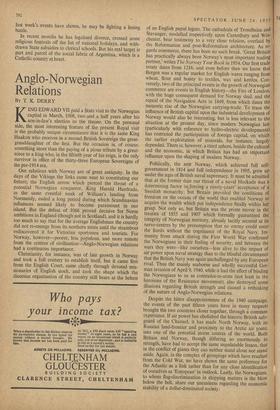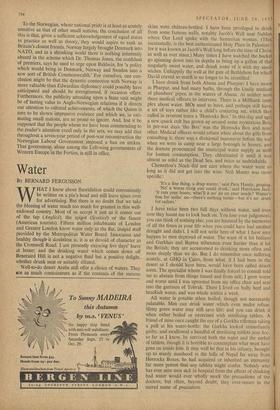Anglo-Norwegian Relations
BY T. K. DERRY KING EDWARD VII paid a State visit to the Norwegian capital in March. 1908, two and a half years after his son-in-law's election to the throne. On the personal side, the most interesting feature of the present Royal visit is the probably unique circumstance that it is the same King Haakon who receives in a second British Sovereign the great- granddaughter of the first. But the occasion is, of course. something more than the paying of a pious tribute by a great- niece to a king who, in the fiftieth year of his reign, is the only survivor in office of the thirty-three European Sovereigns of the ,pre-1914 era.
Our relations with Norway are of great antiquity. In the days of the Vikings the links came near to constituting our fetters; the English arrow which pierced the throat of a potential Norwegian conqueror, King Harald Hardrada, in the same eventful week of William's landing from Normandy, ended a long period during which Scandinavian influences seemed likely to become paramount in our island. But the defeat of 1066 proved decisive for Norse ambitions in England (though not in Scotland), and it is hardly too much to say that for the average Englishman the country did not re-emerge from its northern mists until the steamboat rediscovered it for Victorian sportsmen and tourists. For Norway, however—poorer, less populous, and more remote from the centres of civilisation—Anglo-Norwegian relations had a continuous importance.
Christianity, for instance, was of late growth in Norway and took a full century to establish itself, but it came first from the English Court, came chiefly through devoted mis- sionaries of English stock, and took the shape which the diocesan organisation of the country still bears at the behest of an English papal legate. The cathedrals of Trondheim and Stavanger, modelled respectively upon Canterbury and Win- chester, bear testimony to a very close relation, overlaid by the Reformation and post-Reformation architecture. As re- gards commerce, there has been no such break. 'Great Britain has practically always been Norway's most important trading partner,' writes The Norway Year Book in 1954. Our first trade treaty dates from 1216. and even before then we know that 'Bergen was a regular market for English wares ranging from wheat, flour and honey to textiles, wax and kettles. Con- versely, two of the principal events in the growth of Norwegian commerce are events in English history—the Fire of London, with the huge consequent demand for Norway deal, and the repeal of the Navigation Acts in 1849, from which dates the meteoric rise of the Norwegian carrying-trade. To trace the influence of British capital upon the industrial development of Norway would also be interesting, but is less relevant to the situation at the present day, since modern Norwegian law (particularly with reference to hydro-electric developments) has restricted the participation of foreign capital. on which the earlier exploitation of minerals, for instance, largely depended. There is, however, a third sphere, beside the cultural and the economic, in which Britain has had an important influence upon the shaping of modern Norway.
Politically, the new Norway, which achieved full self- government in 1814 and full independence in 1905. grew up under the tegis of British naval supremacy. It must be admitted that at the former date our threat of a naval blockade was a determining factor in, forcing a ninety-years' acceptance of a Swedish monarchy; but Britain provided the conditions of freedom on the oceans of the world that enabled Norway to acquire the wealth which put independence finally within her grasp. Not only so, but Britain was the prime mover in the, treaties of 1855 and 1907 which formally guaranteed the integrity of Norwegian territory, already tacitly secured at its nerve-centres by the presumption that no enemy could enter the fiords without the cognisance of the Royal Navy. Im- munity from attack during the First World War confirmed the Norwegians in their feeling of security, and between the wars they were—like ourselves—less alive to the impact of air power upon naval strategy than to the blissful circumstance that the British Navy was again unchallenged by any European rival. Thus the mainly seaborne and wholly successful Ger- man invasion of April 9,1940, while it had the effect of binding the Norwegians to us as comrades-in-arms (not least in the heroisms of the Resistance movement), also destroyed some illusions regarding British strength and caused a rethinking of the nature of Anglo-Norwegian relations. • To the Norwegian, whose national pride is at least as acutely sensitive as that of other small nations, the conclusion of all this is that, given a sufficient acknowledgement of equal status in practice as well as theory, they would aspire to rank as Britain's closest friends. Norway largely brought Denmark into NATO, and in a shrinking world there is nothing inherently absurd in the scheme which Dr. Thomas Jones, the confidant of premiers, says he used to urge upon Baldwin, for 'a policy which would bring in Denmark, Norway and Sweden into a new sort of British Commonwealth.' For ourselves, one con- clusion might be that the dynastic connection with Norway is more valuable than Edwardian diplomacy could possibly have anticipated and should be strengthened, if occasion offers. Furthermore, the publicity attending upon a State visit might be of' lasting value to Anglo-Norwegian relations if it directs our attention to cultural achievements, of which the Queen is sure to be shown impressive evidence and which we, in esti- mating small nations, are so prone to ignore. And, lest it be supposed that the people whom we have been commending to the reader's attention excel only in the arts, we may add that throughout a seven-year period of post-war reconstruction the Norwegian Labour Government imposed a ban on strikes. That governmekt, alone among the Left-wing governments of Western EuropeIn the Forties, is still in office.


















































 Previous page
Previous page